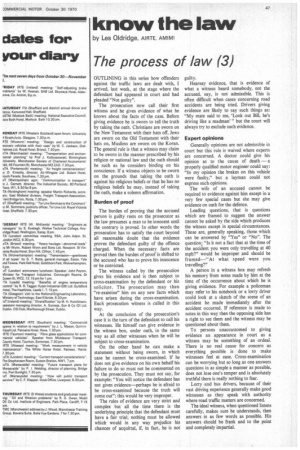know the law
Page 49

If you've noticed an error in this article please click here to report it so we can fix it.
by Les Oldridge, AIRTE, AMIN!!
The process of law (3)
OUTLINING in this series how offenders against the traffic laws are dealt with, I arrived, last week, at the stage where the defendant had appeared in court and had pleaded "Not guilty".
The prosecution now call their first witness and he gives evidence of what he knows about the facts of the case. Before giving evidence he is sworn to tell the truth by taking the oath. Christians are sworn on the New Testament with their hats off, Jews are sworn on the Old Testament with their hats on, Muslims are sworn on the Koran. The general rule is that a witness may claim to be sworn in the manner prescribed by his religion or national law and the oath should be such as he considers binding on his conscience. If a witness objects to be sworn on the grounds that taking the oath is against his religious beliefs or that he has no religious beliefs he may, instead of taking the oath, make a solemn affirmation.
Burden of proof
The burden of proving that the accused person is guilty rests on the prosecutor as the law presumes a man to be innocent until the contrary is proved. In other words the prosecution has to satisfy the court beyond all reasonable doubt that the evidence proves the defendant guilty of the offence charged. When the necessary facts are proved then the burden of proof is shifted to the accused who has to prove his innocence or be convicted.
The witness called by the prosecution gives his evidence and is then subject to cross-examination by the defendant or his solicitor. The prosecution may then "re-examine" him on any new facts which have arisen during the cross-examination. Each prosecution witness is called in this way.
At the conclusion of the prosecution's case it is the turn of the defendant to call his witnesses. He himself can give evidence in the witness box, under oath, in the same way as all other witnesses when he will be subject to cross-examination.
On the other hand he can make a statement without being sworn, in which case he cannot be cross-examined. If he does not give evidence on his own behalf his failure to do so must not be commented on by the prosecution. They must not say, for example: "You will notice the defendant has not given evidence—perhaps he is afraid to be cross-examined because the truth will come out"; this would be very improper.
The rules of evidence are very strict and complex but all the time there is the underlying principle that the defendant must have a fair trial; nothing must be allowed which would in any way prejudice his chances of acquittal, if in fact, he is not Hearsay evidence, that is evidence of what a witness heard somebody, not the accused, say, is not admissible. This is often difficult when cases concerning road accidents are being tried. Drivers giving evidence are likely to say such things as: "My mate said to me, 'Look out Bill, he's driving like a madman'" but the court will always try to exclude such evidence.
Expert opinions
Generally opinions are not admissible in court but this rule is waived where experts are concerned. A doctor could give his opinion as to the cause of death — a properly qualified motor engineer could say: "In my opinion the brakes on this vehicle were faulty," but a layman could not express such opinions.
The wife of an accused cannot be required to evidence against him except in a very few special cases but she may give evidence on oath for the defence.
Leading questions, that is questions which are framed to suggest the answer cannot be asked by the side which produces the witness except in special circumstances. These are, generally speaking, those which can be answered by "Yes" or "No". The question: "Is it not a fact that at the time of the accident you were only travelling at 40 mph?" would be improper and should be framed—"At what speed were you travelling?"
A person in a witness box may refresh his memory from notes made by him at the time of the occurrence about which he is giving evidence. For example a policeman may refer to his notebook or a lorry driver could look at a sketch of the scene of an accident he made immediately after the accident occurred. If reference is made to notes in this way then the opposing side has a right to see them and the witness may be questioned about them.
To persons unaccustomed to giving evidence an appearance in court as a witness may be something of an ordeal. There is no real cause for concern as everything possible is done to make witnesses feel at ease. Cross-examination can be worrying but so long as one answers questions in as simple a manner as possible, does not lose one's temper and is absolutely truthful there is really nothing to fear.
Lorry and bus drivers, because of their vast driving experience generally make good witnesses as they speak with authority where road traffic matters are concerned.
The ideal witness, when questioned listens carefully, makes sure he understands, then answers in as few words as possible. His answers should be frank and to the point and completely impartial.








































































































